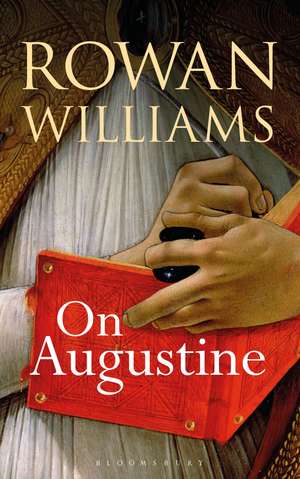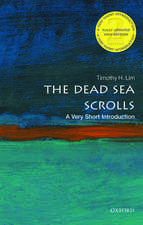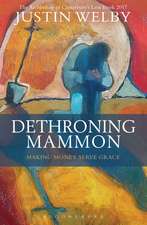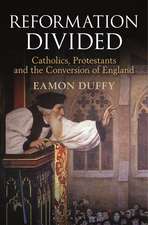On Augustine
Autor The Right Reverend and Right Honourable Lord Williams of Oystermouth Rowan Williamsen Limba Engleză Hardback – 6 apr 2016
Preț: 120.53 lei
Preț vechi: 169.13 lei
-29% Nou
Puncte Express: 181
Preț estimativ în valută:
23.06€ • 24.08$ • 19.09£
23.06€ • 24.08$ • 19.09£
Carte disponibilă
Livrare economică 15-29 martie
Livrare express 01-07 martie pentru 81.52 lei
Preluare comenzi: 021 569.72.76
Specificații
ISBN-13: 9781472925275
ISBN-10: 1472925270
Pagini: 240
Ilustrații: No illustrations
Dimensiuni: 153 x 234 x 27 mm
Greutate: 0.52 kg
Editura: Bloomsbury Publishing
Colecția Bloomsbury Continuum
Locul publicării:London, United Kingdom
ISBN-10: 1472925270
Pagini: 240
Ilustrații: No illustrations
Dimensiuni: 153 x 234 x 27 mm
Greutate: 0.52 kg
Editura: Bloomsbury Publishing
Colecția Bloomsbury Continuum
Locul publicării:London, United Kingdom
Caracteristici
A new book from Rowan Williams will be keenly anticipated, widely reviewed
Notă biografică
Rowan Williams was Professor of Divinity at Oxford before becoming Bishop of Monmouth in 1992. After ten years as Archbishop of Canterbury, he became Master of Magdalene College, Cambridge, in 2013, and is internationally well-known as a theologian, poet and commentator on current affairs.
Cuprins
IntroductionAbbreviations and Notes on Translations1 'A Question to Myself' Time and Self-Awareness in the Confessions2 The Soul in Paraphrase: Augustine as Interpreter of the Psalms3 Language, Reality and Desire: The Nature of Christian Foundation4 'Good for Nothing?' Augustine on Creation5 Insubstantial Evil6 Politics and the Soul7 Augustine on Christ and the Trinity: An Overview8 Wisdom in Person: Augustine's Christology9 The Paradoxes of Self-Knowledge10 Sapienta: Wisdom in Person: Augustine's Trinitarian Relations11 Augustinian LoveGod in Search: A SermonIndex
Recenzii
This is a book that I have been waiting all my adult life to read - though I did not realise it ... Again and again, I put this book down and wished that it were compulsory reading for all those who, in our public forum, think that they are engaging in intelligible conversations when they are merely mouthing sounds.
Rowan Williams is a superb and sophisticated advocate for Augustine against his critics . His On Augustine is a brilliant example of how classical Christian theology thinks for the present by close re-reading of great thinkers of the past.
This book is one of the most substantive, wide-ranging and provoking theological engagements with Augustine's corpus available in English - and it is one of Williams' finest theological texts. Augustine is embraced, but also creatively stretched and resisted; to watch this movement is to see Williams performing his vision of how the Christian tradition should be engaged.
Augustine provides us with the proper foundation for a thought-through faith. It is this, a commitment to an "open" Augustinianism, which makes this book worthwhile, and a useful antidote to the readings that try to use Augustine as a soldier in their own doctrinal and cultural wars.
Rowan Williams is sometimes described as the 'godfather' of Radical Orthodoxy. He is certainly a fan of Augustine and in this new collection of essays that were written over the past 25 years he answers many of the great theologian's critics ... there are a great many passages that make the reader stop and reflect and appreciate a new insight.
A powerful vision of the concerns which underlie and integrate Augustine's work ... All readers will hear, and be moved by, the voice of a writer for whom theology, spirituality, and investigation of the human condition are as intimately connected as they were for Augustine
This book is essential, but challenging, reading for anyone to whom Augustine matters. It is the result of 25 years' profound thinking and lecturing on the questions it covers and has a depth and range which mere historians of Augustine's lifetime will struggle to follow. The range of this book cannot be summarized in a review. It is stratospherically intelligent and a heartfelt appreciation of Augustine's similar strengths.
The essays in this excellent book bring Augustine's theology to life so that he becomes a contributor to ongoing theological conversation. This book deserves a wife reading. It will benefit clergy, seminary students, theologians, Augustine scholars, and more. Every seminary and university library should have it.
Rowan Williams is a superb and sophisticated advocate for Augustine against his critics . His On Augustine is a brilliant example of how classical Christian theology thinks for the present by close re-reading of great thinkers of the past.
This book is one of the most substantive, wide-ranging and provoking theological engagements with Augustine's corpus available in English - and it is one of Williams' finest theological texts. Augustine is embraced, but also creatively stretched and resisted; to watch this movement is to see Williams performing his vision of how the Christian tradition should be engaged.
Augustine provides us with the proper foundation for a thought-through faith. It is this, a commitment to an "open" Augustinianism, which makes this book worthwhile, and a useful antidote to the readings that try to use Augustine as a soldier in their own doctrinal and cultural wars.
Rowan Williams is sometimes described as the 'godfather' of Radical Orthodoxy. He is certainly a fan of Augustine and in this new collection of essays that were written over the past 25 years he answers many of the great theologian's critics ... there are a great many passages that make the reader stop and reflect and appreciate a new insight.
A powerful vision of the concerns which underlie and integrate Augustine's work ... All readers will hear, and be moved by, the voice of a writer for whom theology, spirituality, and investigation of the human condition are as intimately connected as they were for Augustine
This book is essential, but challenging, reading for anyone to whom Augustine matters. It is the result of 25 years' profound thinking and lecturing on the questions it covers and has a depth and range which mere historians of Augustine's lifetime will struggle to follow. The range of this book cannot be summarized in a review. It is stratospherically intelligent and a heartfelt appreciation of Augustine's similar strengths.
The essays in this excellent book bring Augustine's theology to life so that he becomes a contributor to ongoing theological conversation. This book deserves a wife reading. It will benefit clergy, seminary students, theologians, Augustine scholars, and more. Every seminary and university library should have it.







